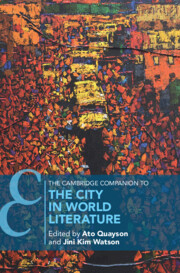Book contents
- The Cambridge Companion to the City in World Literature
- The Cambridge Companion to the City in World Literature
- Copyright page
- Contents
- Contributors
- Chronology of Political, Literary, and Cultural Events
- Chapter 1 Introduction
- Part I Critical Approaches
- Part II Spotlight Literary Cities
- Chapter 5 The Neighborhood and the Sweatshop
- Chapter 6 “The Whole World in Little”
- Chapter 7 Unworlding Paris
- Chapter 8 Sketching the City with Words
- Chapter 9 Romance and Liminal Space in the Twentieth-Century Cairo Novel
- Chapter 10 Bombay/Mumbai and its Multilingual Literary Pathways to the World
- Chapter 11 At Home in the World
- Chapter 12 Imagining the Migrant in Twenty-First Century Johannesburg
- Chapter 13 Russia
- Chapter 14 “Cityful Passing Away”
- Chapter 15 From Altepetl to Megacity
- Chapter 16 (In)Visible Beijing Within and Without World Literature
- Chapter 17 Worlding Lagos in the Long Twentieth Century
- Chapter 18 Haunted Vitality
- Select Bibliography
- Index
- Cambridge Companions To …
Chapter 15 - From Altepetl to Megacity
Narrating Mexico City as World Literature
from Part II - Spotlight Literary Cities
Published online by Cambridge University Press: 13 July 2023
- The Cambridge Companion to the City in World Literature
- The Cambridge Companion to the City in World Literature
- Copyright page
- Contents
- Contributors
- Chronology of Political, Literary, and Cultural Events
- Chapter 1 Introduction
- Part I Critical Approaches
- Part II Spotlight Literary Cities
- Chapter 5 The Neighborhood and the Sweatshop
- Chapter 6 “The Whole World in Little”
- Chapter 7 Unworlding Paris
- Chapter 8 Sketching the City with Words
- Chapter 9 Romance and Liminal Space in the Twentieth-Century Cairo Novel
- Chapter 10 Bombay/Mumbai and its Multilingual Literary Pathways to the World
- Chapter 11 At Home in the World
- Chapter 12 Imagining the Migrant in Twenty-First Century Johannesburg
- Chapter 13 Russia
- Chapter 14 “Cityful Passing Away”
- Chapter 15 From Altepetl to Megacity
- Chapter 16 (In)Visible Beijing Within and Without World Literature
- Chapter 17 Worlding Lagos in the Long Twentieth Century
- Chapter 18 Haunted Vitality
- Select Bibliography
- Index
- Cambridge Companions To …
Summary
Different literary strategies tied to the peculiarities of the city itself have been used to write Mexico City. This is a roughly chronological attempt to understand the dialog between the materiality of the city and the mirrors literature has held to it. We first focus on distance as obstacle to reach Mexico City––both for Aztecs and later for the conquistadors–– but also allowing authors to encompass the whole city. Distance is embodied in the gaze of the traveler who discovers the city anew as does, for instance, Frances Calderón de la Barca. As the texts of these visitors prove, the city is not only extensional, it is always conditioned by the past, modeling, and shaping the present. Offering a total view of the city became more challenging as the 20th Century progressed. This however is achieved in the novel, from Federico Gamboa to Carlos Fuentes. After the 60’s, fiction tends more and more to partial accounts of the metropolis and non-fiction privileges moments when the city beats in unison, as exemplified by Elena Poniatowska´s work. Mexico City has been portrayed as an urban tsunami. Extensive areas remain largely absent from the citys literature and cultural production.
Keywords
- Type
- Chapter
- Information
- The Cambridge Companion to the City in World Literature , pp. 232 - 247Publisher: Cambridge University PressPrint publication year: 2023

